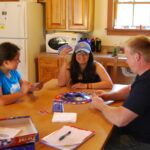*Some of the links within this post are affiliate links. If you click on the link and purchase an item, I receive a small compensation from certain items.
 In order to change the world as parents, one of the first things that we have to consider is teaching children to be respectful.
In order to change the world as parents, one of the first things that we have to consider is teaching children to be respectful.
When someone is respectful, it reflects attentiveness and caring towards others.
If we all learned to be respectful of one another (instead of being critical, judgmental and even envious of one another), just think about how much nicer the world would be to live in!
I don’t know about you, but I want my children to live in such a nicer world!
I don’t want my children growing up and having to be a part of the cruel, selfish, horrific world that we have currently been living in lately.
Sure, I can’t shield my children from every negative thing on this planet!
And neither can you. 
But I most certainly can teach my children to be respectful so that, hopefully, in turn, others will be respectful back.
Then, and only then, can a kindness chain start and the world transition to a more friendly place.
Let that chain start with your child.
So, how to do that, you ask?
Let’s take a look:
1. Understand the Word Respect
 Does anyone really even know what the word respect even means?
Does anyone really even know what the word respect even means?
I feel as though some of our words are thrown around so much that we let them go in one ear and out the other.
They have little meaning to us because we hear them so much that they start to drown out in our minds and in our souls.
Listen.
Sometimes we need to just stop and take a step back.
Sometimes we just have to reflect on what words in our language mean and review the significance of them.
The word respect. 
It is a very important word.
Yet we treat it like a leftover grilled bacon and cheese sandwich!
I encourage you to start by understanding the idea of respect.
2. How Do You Show Respect?
 After reading and understanding the valuable word of respect, let’s take a look at the everyday things that you do in order to show respect.
After reading and understanding the valuable word of respect, let’s take a look at the everyday things that you do in order to show respect.
Respect doesn’t just go for people.
It goes for animals.
It goes for the items that we value.
How about the plants and trees in our own backyards?
What about surrounding bodies of water?
Are you still using them plastic straws, or have you transitioned to a stainless steel one?
I am not trying to pressure you into feeling guilty about all of the many ways of respect that you don’t do that you feel you should be doing.
I am simply trying to point out all of the ways that you probably naturally show respect for the world around you and do not even realize it!
Can we always do better?
Yes!
Absolutely!
3. Make a List
 I want you to stop reading this right now and make a list of all of the ways that you show respect for others and to the world around you.
I want you to stop reading this right now and make a list of all of the ways that you show respect for others and to the world around you.
Do you recycle those cereal boxes every week?
Kudos to you!
You are respecting the planet!
Do you watch over the neighbor’s dog when she goes out of town?
Awesome!
I am sure you are giving her dog good care, which in turn reflects respect.
How about those old photos of your grandmother’s?
Oh! You put them in a special place to protect them from fading?
Excellent! 
You are respecting valuable items.
Whoa!
Wait a minute!
You…you do what???
You make certain to clean the toilets every week?!
Well, now…aren’t you a champion of respect?!
 You see, even making certain that the toilets are clean shows respect for the bathroom in your house and for the people around you who use that bathroom.
You see, even making certain that the toilets are clean shows respect for the bathroom in your house and for the people around you who use that bathroom.
Respect.
Make a list.
Let’s see what you’ve got!
4. Now That You Have More In-Depth Thinking…
Now that you have thought more deeply about the notion of respect, let’s think about how we can teach this to our children.
You see, once you have more insight into certain things, you can do a better job of helping your children to understand that very thing that you want them to learn, as well.
When we learn to dig deeper and look further, we become more acquainted with a subject matter. 
And then we are able to teach about it better!
I am sure that you are already doing a great job of showing your child how to be respectful and do not even know it!
But let’s break it down a little more for our children so that they, too, can recognize the goodness of those “pleases” and “thank yous.”
What Do You Imagine for Your Child?
What do you imagine your child doing or saying when you imagine him being out in the community?
For me, I imagined my son being friendly and giving a smile to those around him.
 I imagined him holding the door open for someone.
I imagined him holding the door open for someone.
I also thought about how he would offer to help out those around him.
But the number one respectable notion that I really wanted to see him do was to learn to say “Yes/No/Sir/Ma’am.”
Now, hold on a minute all of you who are saying “That’s so old school! My kid ain’t learning that!”
And to those of you who are saying, “I hate being called ma’am! It makes me feel like I’m an old lady!”
Addressing someone with “sir” or “ma’am” actually has very little to do with making someone feel old.
That is just something that we tell ourselves nowadays. 
It has everything to do with simply being mindful and respectful of those around us.
Those terms are still used in our country’s army today.
Why?
Because it is a sign of respect.
Plain and simple.
Now, you may not want your child to address others this way, and that is fine.
But I wanted my son to learn to.
A Little Story about Sir and Ma’am
 When I was younger, I dated a gentleman who was in the army.
When I was younger, I dated a gentleman who was in the army.
He always addressed me with “ma’am” and whenever he said this, it just swept me off of my feet!
I may have said something as simple as, “Would you like to go grab some ice cream?”
And he would come back with, “Yes, ma’am! I sure would!”
Something as simple and polite as that made me feel so good!
Why?
Because it told me that he had the utmost respect for me as a human being.
It wasn’t about me “being old” or him being “too drilled.”
It was simply about respect for me as an individual. 
Every time he would say, “yes, ma’am” it warmed my heart and made me feel valued.
I also appreciated when we would go out to eat and he would address others in this manner, as well.
I felt good being around someone who had so much admiration and respect for the people in our community.
The Difference…
Kids today to their parents and grandparents: “What up, dawg?”
Now, that is just one example of many such words/phrases kids say to folks today.
Think about that example for a minute.
 Compare “What up, dawg?” to something like, “Yes, sir. Yes, ma’am.”
Compare “What up, dawg?” to something like, “Yes, sir. Yes, ma’am.”
For some of you who are totally against the whole “Sir/ma’am” salutation, you don’t have to jump outta your shorts about it!
I am not making you teach your kids to say that.
I just simply want you to note the difference between a term like, “What up, dawg?” and “Yes, sir. Yes, ma’am.”
Think about it.
What are your thoughts?
Do you see the difference in the line of respect between the way our children talk nowadays to the way that children used to talk?
How would you prefer your children talk to you or to your parents or to others in your community?
5. Teach What You Imagine and Start Young!
 Besides using certain terms to be respectful, how do you imagine your child behaving in a respectful manner?
Besides using certain terms to be respectful, how do you imagine your child behaving in a respectful manner?
Take what you have imagined and start teaching it!
And teach when they are young!
My son was only 3 when I started to teach him to let the adults around him take a chair before he did.
I also taught him to hold the door open for others.
Unlike so many people today, I am very old school.
I don’t understand the riff with woman today (reminder here: I am a woman!) who don’t want a man to hold a door for them or to buy their lunch for them when they are out on a date.
Sure, women are trying to make more of a ground for themselves in this world, but those actions were never really about a woman being dependent on a man.
They were simply about respect for the woman. 
Now, if a man handed a woman a broom or told a woman that she was not allowed to work and had to stay home and care for the kids, then that’s different.
But holding a door, paying for lunch, pulling the chair out for the woman when she goes to sit down….to me, that’s all respect.
And I wanted my son to be respectful in that manner.
Now you may not want your child to be that respectful.
Maybe you just want your child to do this or that.
The point that I am trying to make here is that you should think about exactly how you would like your child to show respect and then go from there.
 Maybe you just want your child to be friendly, so you teach him/her to wave to the neighbors as they walk by.
Maybe you just want your child to be friendly, so you teach him/her to wave to the neighbors as they walk by.
Perhaps you just want your child to learn to offer guests a drink when they come into your home.
That’s perfectly fine!
The thing is this…
The more respectable things that you teach your child when they are at a young age, the more respectable of a person he/she becomes.
Period.
Let’s Side-Track for a Minute: The Difference Between Respect and Freedom
 We are all hot and heavy nowadays about not letting certain things impede on our freedom.
We are all hot and heavy nowadays about not letting certain things impede on our freedom.
Someone reading this may say, “Well, I’m not teaching my kid any of that because that takes away my child’s freedom to be who he wants to be.”
Ok.
Cool.
You can think that.
Sure!
But what happens when your child has ultimate freedom?
We all know this…
They become a spoiled brat! 
The kid everyone tolerates but no one wants to be around.
The child that grows up and ends up in prison because he never learned boundaries as a child so he doesn’t learn boundaries in society.
He feels free to drink and drive or to rob a bank because – hey!
He was taught that he doesn’t have to abide by rules!
And he doesn’t have to do what his parents’ guide him to do.
Why?
Because all of that would mean stepping on his freedom.
 And his parents did not want to limit his freedom.
And his parents did not want to limit his freedom.
Does that make sense?
You never end up teaching your child respect and then your child grows up to actually be disrespectful to everyone and everything around him…all for the sake of freedom.
Something to think about.
A List of Respect
It can be exhausting trying to examine all of the many ways to be respectful!
When you are a parent – typically a single parent like me – you don’t have that kind of time!
It is going to be enough just to try to teach your child how to be a kind person, nevertheless, have to try to come up with ideas on how to be that way!
If you’re sitting there racking your brain in trying to figure out all of the “respectable” things to teach your child, no worries!
Mama’s Grilled Cheese has already done this thinking for you!
You will find a nice list of some ideas, if you just click here!
6. Role Modeling: The Best Way to Teach Any of the Above
 The number one best way to teach any of the many respectful activities to your child is to simply be a role model for them.
The number one best way to teach any of the many respectful activities to your child is to simply be a role model for them.
If you can’t take the extra second to say, please, thank you, excuse me or I’m sorry to your child then you can’t really expect your child to do the same.
You are your child’s greatest teacher in the world!
They will learn the most from you.
You are someone who your child looks up to.
If you do it, so will they!
If you are someone who snatches items out of your child’s hand, tells them to “beat it” when they’re in your way or pushes them aside to get to an item that you need, then how on God’s green earth will your child ever learn to use appropriate ways to be in those instances?!
Think about how you are around your child and start looking at where you can do some clean up with your own behavior.
My Big Role Model Mistake
 It took a long time, but I finally realized, one day, that my son was snatching items from his little sister and saying, “Give me that!”
It took a long time, but I finally realized, one day, that my son was snatching items from his little sister and saying, “Give me that!”
Well, guess where he got the snatching and give me that phrase from?
Me.
Yup.
I admit it!
I never did it in a malicious way, but it certainly could have come across that way!
Say my son is fiddling with the remote, trying to find his show on TV.
In comes me, annoyed, because I needed him to sit down and eat so we could get moving on to the next activity.
Me: Mumble under my breath the following words: “Give me that” (Sigh) and take the remote from him in order to adjust the channel myself so that we can move along with our day.
Now, I don’t say it mean. 
I say it aloud, but to myself, in a light, but serious tone.
Regardless as to how I say it, it was not a very nice phrase for me to use around him and I really could’ve used a much nicer phrase, such as: Let me see that or Let mama help you with that.
I could be even nicer and say, Hand me the remote, please.
Once I heard my son saying, “Give me that” to his little sister and saw him snatch a toy from her, I realized that I had been making a grave mistake without even realizing it!
How I Corrected It
 We are all human and we are imperfect in so many ways.
We are all human and we are imperfect in so many ways.
This was one of my imperfect moments.
However, the good news is that there is always room to change!
I sat down with my son and I told him that I was sorry that I had used that phrase with him and told him that mommy really should use nicer words when she asks for things.
Apologizing is another way to show respect.
It is something that people do not do very often.
I always admire someone who is willing to genuinely say, “I’m sorry.” 
So, yes, I say, “I’m sorry” to others, but also to my children because even mama messes up and does wrong sometimes.
And just because I am the parent, it does not mean that I still can’t have respect for my own children in this way.
After the apology, we talked about some nicer ways that we could ask for something and some nicer ways of taking something from someone, such as simply waiting for them to hand it to us.
I tried to do better this way so that I could be a better role model form him and for my daughter.
 I think I am doing a good job, for the most part.
I think I am doing a good job, for the most part.
Still, I have my moments, but I have definitely noticed a difference in my son since then.
Now, he says, “Belle, can I have dat car, pweese?”
And, instead of snatching, he holds out his hands and waits for her to give it to him.
7. Make Sure to Reinforce Respectful Behavior!
 As you are going throughout your day being a positive role model for your child, make certain to take note of when your child is engaging in respectful behavior, too.
As you are going throughout your day being a positive role model for your child, make certain to take note of when your child is engaging in respectful behavior, too.
Then, reinforce it!
For instance, when Ryan openly shares his toy with Belle, I say to him, “That was really nice of you to share, Ryan. Thank you for being so sweet to Belle.”
If the day has been really hectic and I never got the chance to reinforce Ryan’s respectful behavior, I will take him in my arms at bedtime and whisper to him, “Thank you for helping to get Belle dressed today and for talking so nicely to grandma on the phone today.”
The important point here is to recognize and acknowledge when your child is being kind and thoughtful.
Too often, we are quick to point out our child’s faults and mistakes.
This step takes some time getting used to because we are often in such a habit of trying to correct what is wrong with our children that we often overlook all of the little, tiny moments when they are on their best behavior.
Try to be more conscious of your child’s very best moments and then highlight those moments with plenty of love and smiles!
Don’t Be Afraid to Incorporate a Little Extra Help!
 In addition to praise and extra love and attention, you can use a tool such as a token board, to help reinforce those respectful deeds!
In addition to praise and extra love and attention, you can use a tool such as a token board, to help reinforce those respectful deeds!
Ryan has a token board that hangs on the fridge.
When he does something well – whether it be sharing an item that he doesn’t care to share or helping around the house or doing well on a learning activity – I hand him a token.
He puts the token on his board and when he fills the board, he receives a special treat, such as a piece of candy or a sticker of his choice.
If we are working on something specific, such as saying, please when he wants something, I may start off handing him a token for every time he says please.
Once he gets the hang of it, I start to require more from him before he gets a token. For instance, he may only receive a token for every other time that he says, please.
I have found that token boards are wonderful tools to help encourage and shape my child’s good, respectful behavior. 
You can always make your own token board, but if you’d rather just purchase one, you can find some here.
If you do not want to go as far as using a token board, you can simply hand your child a special treat at the end of the day, if they have been meeting the expectations that you have for them.
Of course, a simple hug and a whisper of praise in their ear goes a long way, too!
8. Expect No Less Than Your Child’s Very Best!
 Once you have taught your child some kind and polite ways of being, don’t accept anything less!
Once you have taught your child some kind and polite ways of being, don’t accept anything less!
Seriously.
This is where, I believe, many of us parents get off track.
Sometimes, children start off learning well, but then they start to slip and we, as parents, get tired of staying on top of things.
I must admit that I am guilty of this parenting error.
Here is a recent example.
Ryan was on a good path of speaking politely to me and respecting me when I asked him to do something.
Lately, however, he’s grown to be mouthy towards me. 
I believe he is testing boundaries, but where it has gotten out of hand has been on my hands.
You see, I kept giving him the benefit of the doubt.
One day, he’d be mouthy, and sassy and I would give the excuse of “Oh, he’s overtired. I will let it slide.”
The next day would be the same and I would tell myself, “Oh, he’s just going through a phase. I will let it slide today, too.”
You can see now where this started to go wrong!
 I was letting him get away with being disrespectful towards me and his sister by making excuses for him.
I was letting him get away with being disrespectful towards me and his sister by making excuses for him.
I was also not in the mood, too tired or just didn’t feel like implementing a consequence for his behavior either.
Let me just be frank: I flat out just didn’t feel like going the extra step to put him back on the right path.
It was as plain and as simple as that.
Fast-forward to yesterday.
We were outside and Ryan asked to play in the car.
I told him no because it was nice out and he should play with his outdoor toys instead of sitting in a hot car and tinkering with the radio.
He got mad and started making huffing/puffing sounds, folding his arms, stomping his feet and giving me the glare!
Yup!
I got the glare! 
At that point, I gave him the choice of either going inside and we could eat dinner (because I figured he was probably starting to get hungry) or he could stay outside and play with his toys.
Well, since playing in the car was not a choice, he refused to make a choice and continued to huff and puff.
That was my final straw.
Here’s What Happened After the Final Straw!
 I scooped him up.
I scooped him up.
Brought him in the house.
Took off his shoes.
Carried him into his bedroom and stuck him in the crib for a time out.
Then I let him scream, cry, kick, stomp, yell…
When he was done, I went back into the room and said, “Are you ready to be nice now?”
He nodded and gave me a hug as a way to show me nice.
Then I pulled him out of the crib and guess what?
Guess what, folks? 
He was good as gold for the rest of the day!
He was polite, respectful, shared, offered to help…
Everything that I expected from him again.
Now, it is on me to stay on top of his behavior again and the next time he starts to be disrespectful, I will be much quicker to give him a time out rather than make excuses for him day after day.
9. At Least Teach the Bare-Bones of Respect: Please, Thank You, Excuse Me & I’m Sorry
 Now, if you are going to be someone who is going to bitch and moan over having to teach nice things to your child (as I am sure there are folks out there like this), then here is the only thing that I encourage you to, at least, consider.
Now, if you are going to be someone who is going to bitch and moan over having to teach nice things to your child (as I am sure there are folks out there like this), then here is the only thing that I encourage you to, at least, consider.
Simply teach your child to say please, thank you, excuse me and I’m sorry.
If you can focus on those 4 simple phrases, then you are, at least, attempting to keep your child on a solid path.
These 4 simple phrases automatically open the door for empathy and respect for others when used in a genuine manner.
Think about it.
Do you want to raise a child who comes up and snatches a toy from a friend’s hand or do you want to raise a child who says, “please” in their request and politely waits for the response?
Do you want to raise a child who shoves someone out of the way to get to where they are going or do you want to raise a child who says, “excuse me” in their request for the person to move?
Super easy, my friends.
Simple. 
Respectful.
Appreciated.
That’s all!
10. Your Respectful Child Will Help Change the World!
 That’s right!
That’s right!
If you can stay on top of this and invest in the extra time and energy that it takes to help your child stay on the right path, you may be surprised by all of the wonderful things that your child will do for this world someday!
Respect is such a valuable charm!
It can make people smile, give esteem to others, help those around us or save the planet!
In a world that is drowning in hatred, violence and discourtesy, it is even more vital than ever that we set our sights on a more kind, loving and respectful generation of human beings.
This all starts with us. 
Today.
As parents of children of the world’s future.
If we can all just take the time to understand the value of respect…
Review our own behavior in regard to respect…
 Teach our children how to be respectful in nature…
Teach our children how to be respectful in nature…
And
Continue the lesson throughout our children’s lifetime…
Then and only then can we, as parents, actually change this world.
 Find links to all of my favorite parenting items at Mama’s Favorite Things!
Find links to all of my favorite parenting items at Mama’s Favorite Things!

Mama Morgan is a single parent by day and a writer by night! She is raising two, young children with special needs during a global pandemic. She aims to give other parents confidence, hope, and a practical, down-to-earth reading adventure through her own experiences. While Morgan is heavily focused on caring for her little ones, she is also dedicated to helping others and making the world a better place. Mama’s Grilled Cheese is just her delicacy!